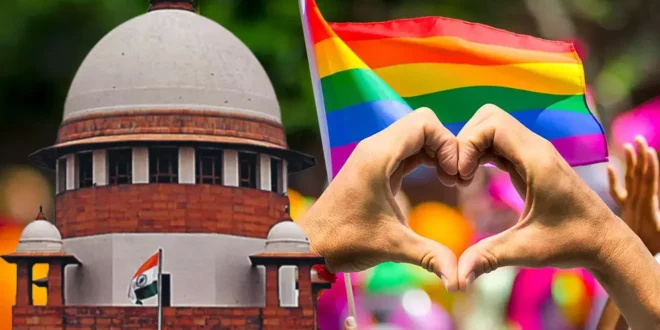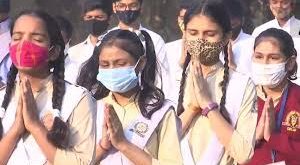New Delhi. The Supreme Court will give its verdict on Tuesday on the petition to give legal recognition to gay marriage. The decision of the Constitution bench of five judges ( 5 judges ) will decide whether gay marriage can be given legal recognition or not. Earlier, after hearing for ten days, on May 11, the Constitution Bench of the Supreme Court hreserved its decision in this case. 20 petitions have been filed in this regard, on which the apex court will give its decision.
The Constitution bench of five judges includes Chief Justice (CJI) D.Y. Apart from Chandrachud, Justice Sanjay Kishan Kaul, Justice S. Ravindra Bhatt, Justice Hima Kohli and Justice P.S. Narasimha is included.
The central government has been opposing the demand for legal recognition of gay marriage from beginning to end. The government has said that this is not only against the cultural and moral tradition of the country, but before giving it recognition, personal law will also have to be tampered with by making changes in 158 provisions of 28 laws.
During the hearing, the bench once even said that without legal recognition, what can the government do to provide relief to these people? That is, what can the government do in Parliament for bank account, inheritance, insurance, child adoption etc.? On this, the government had also said that it is ready to consider the problems of homosexuals by forming a committee of experts under the supervision of the Cabinet Secretary.
What arguments did the Center give?
* Same-sex marriage is an urban elite concept that is far from the social ethos of the country.
* Expanding the concept of marriage beyond heterosexual union is tantamount to creating a new social institution.
* Not a court, but only Parliament takes decisions taking into account the broad views and voices of all rural, semi-rural and urban populations, the views of religious sects and the personal laws as well as customs governing the field of marriage Can take.
* Marriage is an institution which can be created, recognised, given legal sanctity and can be framed only by a competent legislature.
* Constitutional declaration recognizing gay marriages is not so easy.
* To recognize these marriages, 158 provisions of the Constitution, IPC, CrPC, CPC and 28 other laws will have to be amended.
* The Constitution Bench acknowledged that there is considerable substance in the Centre’s arguments that the legislature has the right to consider a law to recognize same-sex marriage, but the court wanted to know what the government could do on the human aspects of the problems of such couples. Is?
* Solicitor General Tushar Mehta presented the list of provisions of the laws.
* He told the court that if the Constitution Bench, while recognizing same-sex marriages, replaces ‘man and woman’ with ‘person’ and ‘husband and wife’ with ‘life partner’ in the Special Marriage Act, then the same applies in the laws of adoption, succession etc. Changes will have to be made.
* Also, the matter will then reach personal law as to who will be the man and woman in a same-sex couple for the purpose of availing benefits under all these laws.
* Then questions of rights regarding adoption, maintenance, protection from domestic violence, divorce etc. will also arise.
CJI DY Chandrachud, who is heading the Constitution bench of five judges, admitted that this will cause three problems.
1. This would involve completely rewriting the law.
2. This would amount to interference in matters of public policy.
3. It will also interfere with the scope of personal law and the court cannot avoid the interplay between the Special Marriage Act and personal law.
* Tushar Mehta said that another problem is that the court cannot make a law that applies differently to heterosexual married couples and same-sex couples.
* Only 34 countries worldwide have legalized same-sex marriages, of which 24 countries did it through the legislative process, while 9 did it through a mixed process of legislature and judiciary. At the same time, South Africa is the only country where this type of marriages have been legalized by the judiciary.
* According to the Centre, the US and Brazil are the leading countries where the mixed process was adopted, the key countries that have legalized same-sex marriage through the legislative process are the UK, Australia, Germany, France, Canada, Switzerland, Sweden, Spain, Norway. , Netherlands, Finland, Denmark, Cuba and Belgium.
* The Center also said that 16 countries have legalized civil unions between members of the LGBTQIA+ community, of which 13 countries have done it through the legislative process and three through a mixed process.
* Tushar Mehta argued that if the plea to give legal recognition to gay couples is accepted then tomorrow someone can come to the court against incest saying that if two adults have decided to have forbidden sex then The state has no right to interfere.
* Mehta said the government may consider tackling some of the issues that same-sex couples are facing without giving them legal recognition.
 Indian Thought Latest News & Views
Indian Thought Latest News & Views



